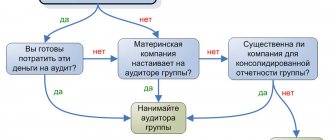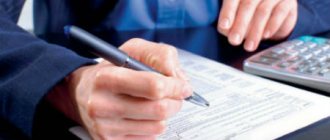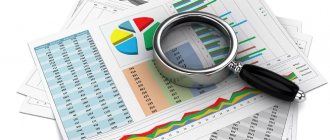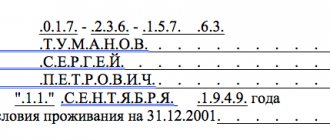Audit and statutory audit
In accordance with Art. 5 of the Federal Law of December 30, 2008 No. 307-FZ “On Auditing Activities”, a certain category of organizations is required to undergo mandatory independent verification of financial and economic activities (audit). For refusal or failure to comply with deadlines, the legal entity and its management will have to answer before the law.
Responsibility for the lack of a mandatory audit is penalties that apply to organizations listed in the law “On Auditing Activities”. For them, an independent audit of accounting is mandatory. We will discuss further what penalties exist for the absence of an audit report.
From the owner’s point of view, the financial costs of the audit are balanced by confidence in the reliability of the data for analyzing the financial position of the business prepared by the accounting service, the quality of the accounting service as an integral part of the organization is tested, and the risks of financial losses are identified.
The procedure for conducting a mandatory audit
As in the case of an audit, which is carried out at the initiative of the company, the basis for a mandatory audit is an agreement concluded between the audited organization (customer) and the audit office (performer).
In the text of the agreement, the parties reflect the direction of the audit (audit of financial statements, tax risks, etc.), indicate the program and schedule of control activities, and also fix the obligations for the auditors to provide an opinion in the prescribed form.
A sample agreement can be downloaded here ⇒ Contract for mandatory audit.
| ★ Best-selling book “Accounting from scratch” for dummies (understand how to do accounting in 72 hours) > 8,000 books purchased |
When does an audit become mandatory?
Certain types of organizations are subject to mandatory audit, regardless of their legal form. Such organizations include, in particular:
— joint-stock companies (including closed joint-stock companies) ;
— organizations whose securities are admitted to trading at stock exchanges and (or) other organizers of trading on the securities market;
— housing savings cooperatives (Article 54 Federal Law of December 30, 2004 No. 215-FZ “On Housing Savings Cooperatives”);
— developers (Article 18 of the Federal Law of December 30, 2004 No. 214-FZ);
— an organization that is a professional participant in the securities market;
— non-state pension or other fund;
A complete list of organizations that are required to conduct an audit is published on the website of the Ministry of Finance of the Russian Federation.
In addition, in general, an audit is required if the financial performance of the organization has reached the following values:
— revenue exceeds 400 million rubles;
and/or
— the balance sheet currency exceeds 60 million rubles.
Financial indicators are taken for the year preceding the reporting year. That is, the need to conduct an audit for 2020 is determined based on the results of an analysis of financial indicators for 2020.
What changes do companies expect in 2020:
- 1. All organizations will submit financial statements electronically only to the Federal Tax Service;
- 2. Organizations subject to mandatory audit, for example:
- having the form of a joint stock company
- or revenue for the previous financial year of more than 400 million rubles,
- or the balance sheet currency for the previous year is more than 60 million rubles, they will have to submit, along with the reporting, a copy of the auditor’s report (and also in electronic form) to the Federal Tax Service.
Audit reports on their accounting (financial) statements of such organizations will be submitted to the Federal Tax Service no later than December 31 of the year following the reporting year. With the exception of organizations with special requirements, provide an audit report by March 31.
Why is all this being done?
The legislation establishes that the state information resource will now be formed and maintained by the Federal Tax Service, and not by statistical authorities. For this, the Federal Tax Service will need:
- electronic copies of accounting (financial) statements of organizations;
- audit reports on the reporting of those organizations that are subject to audit.
The Federal Tax Service must approve the procedure for submitting reports and audit reports in electronic form.
Responsibility
For the absence (non-submission, non-publication) of an audit report on the Fedresource, the legislation provides for administrative liability : clauses 6-8 of Art. 14.25 of the Code of Administrative Offenses of the Russian Federation in the form of a fine in the amount of 5,000 to 50,000 rubles, and in case of a repeated offense - disqualification of the official from 1 to 3 years.
Consequences of failure to conduct a mandatory audit (fines)
1. Fines from tax authorities, executive authorities exercising control and supervision functions in the financial and budgetary sphere, the Accounts Chamber of the Russian Federation and control and accounting bodies of constituent entities of the Russian Federation (Article 28.3 of the Administrative Code).
For failure to provide an audit report to the tax authority, liability is not established (Article 14 of Law No. 402-FZ; subparagraph 5, paragraph 1, Article 23 of the Tax Code of the Russian Federation), however, the tax authority, having established during the inspection that the person being inspected does not have an audit report , has the right to draw up a protocol on an administrative offense.
Article 15.11 of the Code of Administrative Offenses of the Russian Federation provides for fines for gross violations of accounting and reporting rules, including for the lack of an auditor’s report on the accounting (financial) statements (if an audit of the accounting (financial) statements is mandatory). The amount of the fine for a manager for lack of a conclusion ranges from 5,000 to 10,000 rubles, and for a repeated violation - from 10,000 to 20,000 rubles, or the manager faces disqualification for a period of 1 to 2 years.
We also note that in accordance with paragraph 3 of Article 52 of Federal Law No. 208-FZ “On Joint Stock Companies”, information (materials) to be provided to persons entitled to participate in the general meeting of shareholders in preparation for the general meeting of shareholders of the company include , including the annual report of the company and the conclusion of the audit commission (auditor) of the company based on the results of its audit, annual accounting (financial) statements, auditor's report and the conclusion of the audit commission (auditor) of the company based on the results of the audit of such statements.
Thus, the absence of an audit report is a violation of the requirements of the law on the procedure for preparing and holding general meetings of shareholders, participants in limited (additional) liability companies and owners of investment shares of closed mutual investment funds, liability for which is provided for in Part 2 of Article 15.23.1 of the Code of Administrative Offenses of the Russian Federation and entails entails a fine:
— for citizens in the amount of 2 to 4 thousand rubles;
- for officials - from 20 to 30 thousand rubles or disqualification for up to one year;
- for legal entities - from 500 thousand to 700 thousand rubles.
2. Fines from the Bank of Russia
The most serious sanctions may be imposed by the Bank of Russia.
A public JSC is obliged to disclose an annual report and annual accounting (financial) statements (Article 92 of the Federal Law of December 26, 1995 No. 208-FZ “On Joint-Stock Companies”, hereinafter referred to as Law No. 208-FZ). Requirements for the content of the annual report of joint-stock companies are established in the Regulations on the disclosure of information by issuers of equity securities, approved. Bank of the Russian Federation dated December 30, 2014 No. 454-P
Failure by a joint-stock company an audit report on its website on the Internet , as well as failure to submit to shareholders, an audit report within the prescribed period is a violation of legal requirements regarding the presentation and disclosure of information on financial markets. Disclosure of information not in full (accounting statements must be disclosed together with the auditor's report), and (or) unreliable information, and (or) misleading information entails the imposition of an administrative fine:
- for officials - from 30,000 to 50,000 rubles. or disqualification for a period of 1 to 2 years;
— for legal entities — from 700,000 to 1,000,000 rubles. (clause 2 of article 15.19 of the Code of Administrative Offenses of the Russian Federation).
3. Fines from Rosstat
For failure to provide an audit report to a set of financial statements submitted to Rosstat (in the case of a mandatory audit), the organization and its official may face an administrative fine (Article 19.7 of the Code of Administrative Offenses of the Russian Federation):
— from 300 to 500 rubles (for officials);
— from 3 thousand to 5 thousand rubles (for legal entities).
At the same time, the imposition of a fine does not relieve the organization from the obligation to submit an audit report to the statistical authorities (clause 4 of article 4.1 of the Code of Administrative Offenses of the Russian Federation).
Let us note that the storage period of the auditor's report on the accounting (financial) statements is not limited (Part 1, Article 29 of Federal Law No. 402-FZ; Article 408 of the List, approved by Order of the Ministry of Culture of August 25, 2010 No. 558).
The statute of limitations for bringing to administrative liability for violation of accounting legislation is 2 years from the date of commission of the administrative offense (Article 4.5 of the Code of Administrative Offenses of the Russian Federation).
What responsibilities does the organization have?
Currently, the Ministry of Finance of the Russian Federation has prepared a draft (for now it is a draft) of changes to Art. 15.11.1. Code of Administrative Violations. It provides for the following fines for failure to submit legal copies of accounting (financial) statements and audit reports to the Federal Tax Service if the statements are subject to audit.
What are the penalties for managers for failure to report in 2020?
If such a bill is adopted, administrative liability will begin to apply on January 1, 2021.What the head of the organization needs to decide in the outgoing 2019:
In our practice, if a company does not conduct an audit, then violations in reporting occur in 100% of cases , and we must remember that the balance sheet includes comparative figures for 3 financial years. Over the past month, the number of requests for audits has increased sharply; our specialists were called, written and asked how much an audit would cost for a particular organization. The future looks a little scary for executives, but we don't let them panic and warn them against making financial mistakes in 2020. If you have any questions, please contact: Elena Dubinyanskaya, Head of the Audit and Finance Department, OKG |
Statutory audit 2020 and its alternative
There is also liability for failure to enter information about the results of a mandatory audit or their untimely entry into the Unified Register of the facts of the activities of legal entities: a fine in the amount of 5 to 50 thousand rubles (clauses 6–8 of Article 14.25 of the Code of Administrative Offenses of the Russian Federation).
It is also important to note that a statutory audit is an audit only at the end of the year. Consequently, with this option there is no way to prevent errors in a timely manner and find the company’s financial reserves. Moreover, in many cases, nothing can be changed “after the fact.” Thus, 32 million rubles were saved by analyzing the tax consequences of the upcoming transaction. If they had turned to experts for help after the transaction, such an effect would not have been achieved.
We recommend reading: A disabled child of Group 1. If the Father Works, He Can Receive a Pension for Caring for a Disabled Person of Group 1
Gross violation of accounting rules
When an auditor's report is not attached to the annual reports, and its presence is required by law, this also falls under a gross violation of the requirements for accounting (financial) reporting, which must be analyzed by third-party auditors (Part 1 of Article 15.11 of the Code of Administrative Offenses of the Russian Federation).
In this case, the fine is higher - from 5 to 10 thousand rubles. And with repeated violations, it increases exactly 2 times. Or they will be deprived of the right to practice a profession for a period of 1 to 2 years.
According to Article 19.7 and Part 1 of Art. 15.11 of the Code of Administrative Offenses of the Russian Federation, the LLC becomes liable for failure to conduct a mandatory audit when it is required by law.
Also see “Mandatory Audit Criteria for LLCs.”
Rosstat: fine for mandatory audit in 2018
If an organization, by virtue of the law, must conduct a mandatory audit of its annual reports, it means that an audit report must be submitted to the local branch of Rosstat at the place of registration, along with a copy of the financial statements. Moreover, to be on time. Otherwise, the penalties for mandatory audit are as follows (Article 19.7 of the Code of Administrative Offenses of the Russian Federation):
- for the company as a whole - from 3 to 5 thousand rubles;
- for an accountant (most likely) – from 300 to 500 rubles.
The law establishes 2 options for the period when the auditor’s report on the reliability of the financial statements must be received by Rosstat (Part 2 of Article 18 of the Law “On Accounting” No. 402-FZ):
- Together with annual accounting - within the general period.
- If the auditors’ verdict is not yet ready, then the law gives 10 working days from the date of their conclusion, but no later than December 31 of the year following the reporting year.
How to avoid liability for failure to conduct an audit?
The cost of a mandatory audit in most cases is significantly less than administrative fines. In addition, by undergoing an audit in our company, you will receive not only an audit report, but also a report on identified risks, which, by preventing them in a timely manner, you can significantly protect your company and avoid serious consequences.
The Central Bank of the Russian Federation (Bank of Russia), Rosstat, the tax inspectorate, the Central Election Commission, as well as the Ministry of Justice of the Russian Federation can bring an organization to administrative responsibility for failure to conduct a mandatory audit or violation of deadlines.
Is the organization subject to a mandatory accounting audit in 2020?
Mandatory audit is carried out in relation to the organizations specified in Art. 5 of the Federal Law of December 30, 2008 No. 307-FZ “On Auditing Activities”:
1. if the organization has the legal form of a joint stock company;
2. if the organization’s securities are admitted to organized trading;
3. if the organization is:
- credit institution,
- credit history bureau,
- an organization that is a professional participant in the securities market,
- insurance organization,
- clearing organization
- mutual insurance company,
- trade organizer,
- a non-state pension or other fund (except for a fund that has the status of an international fund in accordance with Federal Law No. 290-FZ of August 3, 2018),
- joint stock investment fund,
- management company of a joint-stock investment fund, mutual investment fund or non-state pension fund (with the exception of state off-budget funds).
4. if the volume of revenue from the sale of products, performance of work, provision of services to the organization for the previous reporting year exceeds 400 million rubles or the amount of balance sheet assets as of the end of the previous reporting year exceeds 60 million rubles;
5. if the organization presents and (or) discloses annual summary (consolidated) accounting (financial) statements;
6. in other cases established by federal laws.
Strictly speaking, this list is open. Every year, the Ministry of Finance of the Russian Federation publishes on its website a list of cases of mandatory audit of accounting (financial) statements for the previous year.
List of cases of mandatory audit of accounting (financial) statements for 2020 ()
Let us note that a draft federal law on amendments to Federal Law No. 307-FZ (No. 273179-7) has been prepared for the second reading. Its consideration is scheduled for July 2020.
The government is going to change the requirements for conducting mandatory audits in relation to non-profit organizations.
For example, in paragraph 3 of part 1 of article 5 of the law of December 30, 2008 No. 307-FZ, it is determined that a mandatory audit is carried out if the organization is “another fund”. This means that any non-profit organization created in the legal form of a “foundation” (including a charity) is required to conduct an audit, regardless of the annual turnover of funds and its balance sheet.
The government bill proposes to establish in the law on auditing the requirements for conducting mandatory audits for non-profit organizations (charitable foundations) - owners of endowment capital, specialized endowment management funds.
It is also proposed to provide for a mandatory audit for non-profit organizations - recipients of income from endowment capital, in accordance with the provisions of the laws on non-profit organizations and on the procedure for the formation and use of endowment capital of NPOs.
At the same time, it is proposed to establish a lower limit of financial indicators, if exceeded, a mandatory audit of charitable foundations is carried out, in the amount of 3 million rubles per year. The government is confident that the above amendments will streamline the current legislation regarding the audit of charitable foundations and reduce the organizational and financial burden on their activities.










